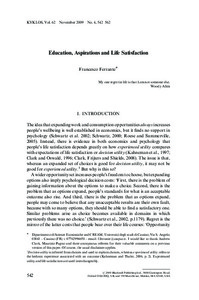Education, aspirations and life satisfaction

Kyklos. International Review for Social Sciences
2009
62
4
542-562
education ; quality of life ; well being
Social protection
English
Bibliogr.
"The idea that expanding work and consumption opportunities always increases people's wellbeing is well established in economics but finds no support in psychology. Instead, there is evidence in both economics and psychology that people's life satisfaction depends on how experienced utility compares with expectations of life satisfaction or decision utility.
In this paper I suggest that expanding work and consumption opportunities is a good thing for decision utility but may not be so for experienced utility. On this premise, I argue that people may overrate their socioeconomic prospects relative to real life chances and I discuss how systematic frustration over unfulfilled expectations can be connected to people's educational achievement.
I test the model's predictions on Italian data and find preliminary support for the idea that education and access to stimulating environments may have a perverse impact on life satisfaction. I also find evidence that the latter effect is mediated by factors such as gender and age.
Indeed, the model seeks to go beyond the Italian case and provide more general insights into how age/life satisfaction relationships can be modelled and explained."
Digital
The ETUI is co-funded by the European Union. Views and opinions expressed are however those of the author(s) only and do not necessarily reflect those of the European Union or the ETUI.